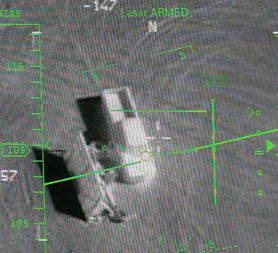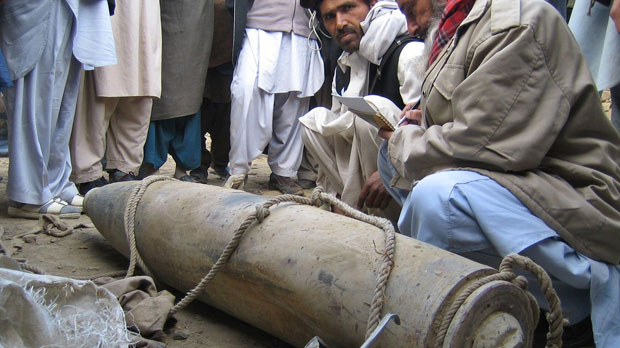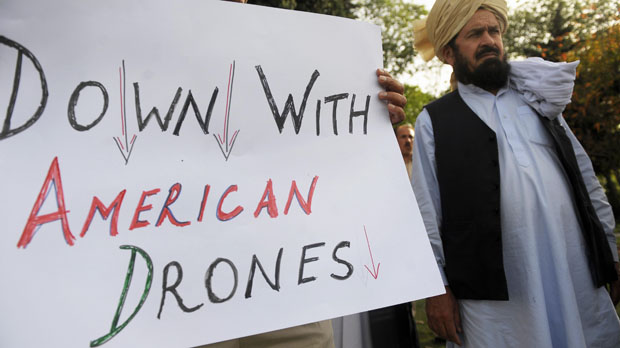CIA drone strikes: a legal war?
A UN senior official tells Channel 4 News if CIA personnel are operating drone strikes in Pakistan, they could be prosecuted for murder and war crimes if humanitarian laws are violated.

The controversial drone policy has significantly increased under Barack Obama‘s administration. It marks a foreign policy shift from the Bush administration, which relied heavily on rendition and detaining suspected militants in Guantanamo Bay.
A Channel 4 News investigation has examined 113 reported drone strikes this year in Pakistan’s tribal territories on the border with Afghanistan, an area considered by the US as a haven for Taliban and al-Qaeda fighters and reported figures suggest 500 to 900 militants have been killed. The number of attacks is double the number conducted last year and by far exceeds the number of drone strikes conducted under the Bush regime.
Pakistan drone warfare - special report
An unspecified number of those killed in the drone attacks – believed to be directed by the Central Intellgience Agency (CIA) – are reported to have been innocent civilians, including women and children, suspected to have “links” with militants Channel 4 News has learnt.
Local people in Waziristan and a Pakistan-based expert from the Campaign for Innocent Victims of Conflict have told Channel 4 News that on top of the 500 to 900 “militant” deaths thought to have been caused by the drone strikes, the number of civilian deaths is likely much higher.
Sometimes covert operations need to remain covert in order to be effective. Mike Baker, former CIA officer
The legality of drone strikes in Pakistan and the alleged role of the CIA has been brought into sharp focus after it was reported that Jonathan Banks, the CIA’s station chief in Islamabad, was pulled out of Pakistan after his cover was blown by tribesmen from North Waziristan who are taking legal action, blaming him for the deaths of their relatives in drone strikes.
In recent days sources say that the US drone policy in Pakistan has apparently spread from Waziristan to the northwestern Khyber region, where three US drone missiles killed a reported 24 “militants” on Saturday.
The UN Special Rapporteur on extrajudicial, summary and arbitrary executions Christof Heyns told Channel 4 News, if these allegations are true, the personnel who operate the deadly drones and their superiors could potentially face prosecution for war crimes, if international humanitarian laws are violated.
He also calls on the US and CIA to be more transparent and accountable in its use of drone attacks on suspected militants along the Afghan and Pakistan border.
Leading international lawyer and Director of the International Bar Association Mark Ellis told Channel 4 News if civilian deaths are underreported by the US and if there is “an allegation of an alleged cover-up” it “should certainly prompt an investigation for possible war crimes”.
President/co-founder of Diligence LLC, a global intelligence and risk management firm, and a former CIA covert operations officer Mike Baker told Channel 4 News: “Sometimes covert operations need to remain covert in order to be effective.”
Channel 4 News Washington Correspondent Sarah Smith reported on US military drones in June, 2010.
Drone operators and targets
It is known that theUS military operate drones in Afghanistan, of which there is an acknowledged “armed conflict”, but it is widely reported that the CIA operate drones in Pakistan – a place where the US is not involved in a known “armed conflict”.
The CIA does not admit or deny that it conducts drone attacks on Pakistan or any other country, but it is widely suggested that these “covert” drone strikes in the tribal areas are controlled by the CIA from bases in America, 8,000 miles from the target.
Peter Singer from the Brookings Institute told Channel 4 News: “You have people outside the military chain of command, making decisions about the use of force in a way that would have previously been done inside the military.”
He explained: “The general counsels at the CIA are very serious professional men and women, but they are not military JAG officers. Military lawyers trained for questions surrounding use of force and rules of engagement in air strikes.”
The International Bar Association’s Mark Ellis says there is nothing wrong legally with operating drones from a remote location.
If a targeted killing violates international humanitarian law then regardless of who conducts it – intelligence personnel or state armed forces – the author, as well as those who authorised it, can be prosecuted for war crimes. Christof Heyns, UN Special Rapporteur
But he referred to the Geneva Convention, which states that only members of the regular armed forces involved in an international armed conflict are entitled to combatant status and attendant privileges. CIA members – not covered by this status – could therefore could be breaking international law.
Ellis said: “Lawful combatants are defined as individuals who are members of an organised force, the force used belongs to a party to the conflict, the force is under the command of a person responsible for his subordinates, the member of the force wears a fixed, distinctive sign, recognisable at a distance, they carry arms openly and they conduct operations in accordance with the laws and customs of law.”
Mr Ellis added: “Because members of the CIA do not fall into this category, they would not receive wartime privileges (for example, prisoner of war status if captured) even when engaged in armed combat.”
The UN Special Rapporteur Christof Heyns went further and suggested in some circumstances it is possible that the personnel who carry out the alleged attacks could face prosecution.
He told Channel 4 News CIA officers are “unlike state armed forces” which would generally be immune from prosecution for the same conduct (assuming they complied with international humanitarian law requirements). Thus, CIA personnel could potentially be prosecuted for murder under the domestic law of a country in which they conduct targeted drone killings, and could also be prosecuted for violations of applicable US law.
“And, if a targeted killing violates international humanitarian law then regardless of who conducts it – intelligence personnel or State armed forces – the author, as well as those who authorised it, can be prosecuted for war crimes.”
Civilian victims
Channel 4 News has learned that civilians, including women and children – some of whom are suspected of having links to alleged militants – have also been victims of the US drone strikes in Waziristan. The implications of this could potentially incriminate the drone operators and US authorities, because a country carrying out attacks must legally try to protect civilians.
The International Bar Association’s Mark Ellis explained: “If a party does use civilians as shields (al-Qaeda for example), the laws of war does not negate the legal obligations of the other party to protect civilian populations. It does not relieve the obligation to distinguish between civilians and combatants, taking all feasible cautions to protect civilians. Civilian casualties must be weighed against the military advantages which are expected to result from the attack.”
Pakistan drone strikes: secret war – interactive graphic
Legitimate targets: the principles1. Only combatants and other military objectives are lawful targets; the civilian population and 'civilian objects' must not be made the target of attack (the principle of distinction); and
2. Even military objectives may not be attacked if an attack is likely to cause civilian casualties or damage which would be excessive in relation to the concrete and direct military advantage which the attack is expected to produce (the principle of proportionality)
The International Committee of the Red Cross outlined three principles which constitute a civilian considered to be a Direct Participant in Hostilities: there must be a "threshold of harm" that will result from the person's act; the act must cause expected direct harm; and the act must have a "belligerent nexus", in that it must be specifically designed to support the military operations of one party.

Civilian casualties
UN Special Rapporteur Christof Heyns said the civilian impact Channel 4 News has examined is worrying and that efforts taken to reduce collateral damage hold little weight.
He said it was “very troubling” and raised concerns about “the lack of information about precautions taken to minimise civilian casualties, what is done if mistakes are made”.
“The concept of allowance for the killing of civilians as ‘collateral damage’ does not exist outside the scope of armed conflict.”
So the question arises as to whether the US is actually in an “armed conflict” or not. Whatever the answer, it will go a long way to determining if its “collateral damage” is legally proportionate and necessary or not.
Mark Ellis said: “Only combatants and other military objectives are lawful targets; civilians and civilian objects are never legitimate targets. Even attacks on military targets that may disproportionally impact civilians are illegal.
“Specifically in relation to drones, some proponents claim that drones are superior because they allow for enhanced precision and accuracy in attacks, avoiding civilian casualties.”
Channel 4 News has been told by Pakistani sources on the ground in Waziristan that they believe the true numbers of civilian casualties are not being reported by the media or the US.
Typically, people who argue that any secrets or covert operations are terrible and must be exposed have never operated in the real world or think all government activities are nefarious. Mike Baker, former CIA officer
Christopher Rogers from Civic also told Channel 4 News: “It’s almost certain that US drone strikes are causing more civilian casualties than the US has thus far admitted.”
Reacting to this, Mark Ellis said: “The issue regarding war crimes is relevant because of the alleged attacks against civilians, not because of an alleged cover-up. An allegation of an alleged cover-up, however, should certainly prompt an investigation for possible war crimes.”
Christof Heyns told Channel 4 News that the reporting of civilian casualties from drone strikes in Pakistan is particularly important when talking about transparency and accountability.
He said: “The important issue with CIA involvement in or control of drone strikes is that there is no transparency or accountability for their actions because they operate covertly. This is a very different situation from the military. Problems of transparency and accountability in the military are well-known, but there is at least the potential for the results of military operations or investigations to be made public, for court martials to take place etc.
“This is why I and my predecessor have raised concerns about drone strikes operated by the CIA in particular – because of their covert nature, they undermine basic accountability and transparency principles.”
Former CIA officer Mike Baker told Channel 4 News he is in no doubt that to question covert operations would prove a very big mistake.
He said: “OK… admittedly maybe I’m missing something here… take covert operations and make them overt and focus on transparency and maybe things will work out just fine? Good luck with that.
“Typically, people who argue that any secrets or covert operations are terrible and must be exposed have never operated in the real world or think all government activities are nefarious.
“This is the same crowd that sits at home cursing all the byzantine one world government plots to read our minds and turn us all in to zombies. Sometimes covert operations need to remain covert in order to be effective.”
Channel 4 News Correspondent Nick Paton Walsh reported on thermobaric bombs in August, 2007.
Drone wars: thermobaric bombs and a ‘Playstation’ mentality
One of the concerns raised by Christof Heyns’ predecessor Philip Alston in a UN report on drone strikes earlier this year, was that those who operate the missile strikes thousands of miles from their target, may acquire a “Playstation” mentality.
His successor Christof Heyns said this is still a major concern for the UN: “The concern here is that many of those operating drones are many thousands of miles away from the battlefield, outside harm’s way, and so they are removed from the realities of violence and war on the ground and often in situations where there is not an appropriate emphasis on international humanitarian law.
“In addition, they view the battlefield just through computer screens and operate via controls, similar to a video game. One of the concerns is that the distance and the interface operates to trivialise what the soldiers are doing, thereby making it easier to kill, and lowering the threshold for when force is used.”
Mark Ellis does not necessarily agree with this thesis, telling Channel 4 News: “The same precautions that must be taken to prevent unnecessary civilian deaths apply to the operation of drones. A ‘Playstation’ mentality might weaken this concept, but it is not necessarily the case.”
But former CIA officer Mike Baker told Channel 4 News: “The drone strikes are very accurate in targeting… frankly, far more accurate than a suicide bomber’s mayhem in walking into a market or mosque.
“The drone strikes are very effective and a significant tactical advantage that is correctly being utilised in the war on terror. The program is methodical and labour intensive in target selection and acquisition… It is not simply throw a drone up and let’s see what we can get.
Any concerns? No.”
The international community should work towards greatly limiting the use of these types of weapons. Mark Ellis, International Bar Association
What Mr Ellis is concerned about is the use of particularly destructive weapons via the drones. It has been reported, but Channel 4 News cannot verify due to the CIA’s covert policy, that the drones in Pakistan are operated by the CIA and that they fire the Hellfire AGM 114N missile, which is a thermobaric weapon.
By this, the weapon is designed to target a specific building, where a militant may be hiding, and it vaporises that building with hot air and a fine aluminium powder, before igniting the explosives, thus killing the target, but not causing too much “collateral damage” in the surrounding areas.
Mr Ellis said: “My concerns with these weapons are the same as with the use of white phosphorus and other incendiary weapons that are prohibited in all circumstances where the military objective located within a concentration of civilians the object of attack by air-delivered incendiary weapons. Nor can these same weapons be used directly against military personnel.”
He then called for the international community to limit the amount of these types of weapons that are being used: “Although these incendiary weapons are not per se illegal, they can clearly and easily cause ‘unnecessary suffering’ and, thus, violate international law. The international community should work towards greatly limiting the use of these types of weapons.”
US drone policyIn March this year, the Obama Administration's legal adviser Harold Hongju Koh, addressing the American Society of International Law, defended the policy by arguing that drone attacks are a form of "self-defence" in "an armed conflict with al-Qaeda, as well as the Taliban and associated forces".
The drone attacks are said to have substantially increased since Barack Obama took office. Former CIA covert operations officer Mike Baker told Channel 4 News: "Basically (drones strikes have increased) because they work. The increase in strikes is not just in the past year... since Obama took office their use has increased dramatically compared to the Bush/Cheney administration. A point that drives the left crazy."

CIA accountability
UN Special Rapporteur Christof Heyns told Channel 4 News that the US and in particular the CIA need to be more accountable and transparent over its use of drones to target kill suspected militants in Pakistan’s tribal areas.
He said this was important for two reasons: “Surveys and studies in the region indicate that many Pakistanis and Afghans are very concerned about the way that drones, airstrikes, targeted killings, raids etc are carried out. There are also serious concerns that such methods help to foster anti-American sentiment, and are used to recruit new members of al-Qaeda and to justify acts of terrorism.
“In general it creates dangerous precedents and serves to undermine the status and role of a system of international law that should serve to regulate the use of force between nations around the world, in all kinds of crises situations.”
Do the methods comply with human rights and humanitarian law? And do they assist in reducing terrorism and promoting long-term peace in the region? Christof Heyns, UN Special Rapporteur
Mr Heyns said there are two central questions that should always be in mind when a state decides to conduct a drone strike in another country: “Do the methods comply with human rights and humanitarian law? And do they assist in reducing terrorism and promoting long-term peace in the region?
“It is not clear that the answer to either question is yes, and governments should devote more attention to internally and publicly addressing these issues.”
Former CIA officer Mike Baker told Channel 4 News the responsibility for national security should be in the hands of each state.
He said: “Good God… that’s what we need… the UN and special rapporteur could be the arbiters of what keeps us safe. Every country acts according to its own self interest… not an epiphany, just a factual statement.
“The day that we abdicate responsibility for our national security interest to the UN will be the day we lose the war on terror. Perhaps the UN could first focus on the violence and mayhem caused by Muslim extremists… Sort that out and then check with the US, UK, France, Pakistan etc about our conduct.”